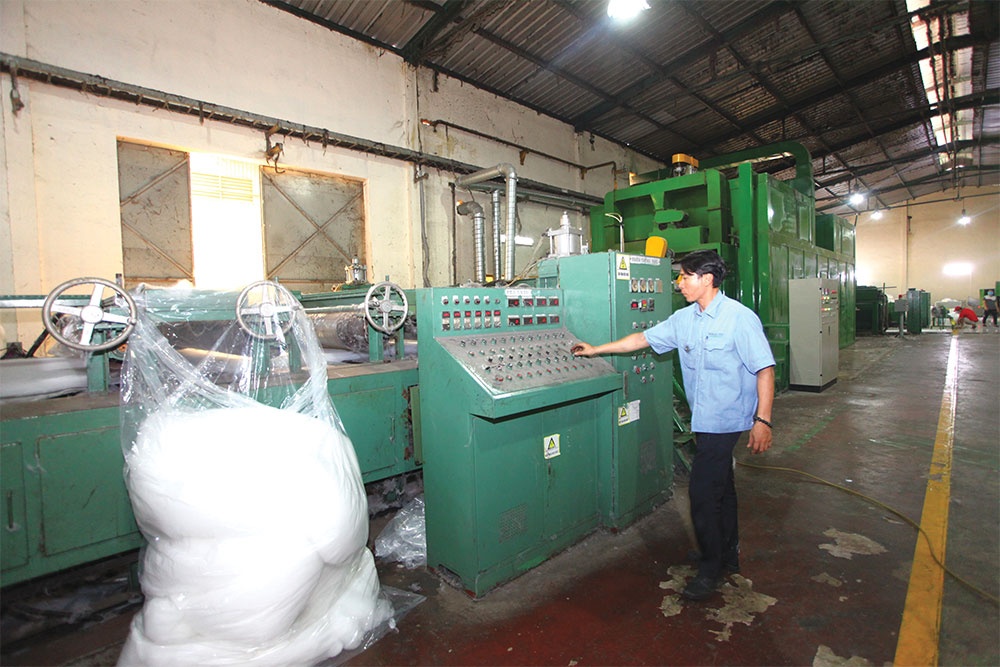Foreign-led groups neglecting sci-tech fund involvement
 |
| Some projects are too slow in upgrading essential technology and equipment |
The sci-tech fund, first mentioned in the 2013 Law on Science and Technology, has yet to complete its mission to create new advantages for enterprises to conduct research, and develop technology and innovation.
National Assembly (NA) deputy Pham Van Hoa from the Mekong province of Dong Thap last week asked Minister of Science and Technology Huynh Thanh Dat to clarify the reason for the slow process in the disbursement of the fund, and also why no foreign-invested enterprises were contributing to it, including large-scale groups such as Samsung, LG, or Panasonic.
Minister Dat responded, acknowledging that the incentive policies for using the fund were not appropriate or practical. For many years, these policies have not been widely applied by enterprises, he said.
“The number of enterprises that are capable of participating is modest. Because of limited resources, they find it difficult to raise money,” Minister Dat said.
“In addition, when enterprises want to utilise the money in the fund to invest in technology, and manufacturing lines to improve the capacity, the procedures are extremely complicated. Thus, large-scale investors do not want to contribute to the fund, which makes it less attractive,” he added.
The latest statistics from the General Statistics Office of Vietnam show that from 2015 to 2021, only 1,281 enterprises, economic groups, or general corporations set up and used sci-tech funds, worth VND24 trillion ($1 billion).
Last year, the Ministry of Science and Technology (MoST) and the Ministry of Finance enabled two circulars guiding the implementation of Resolution No.43/2022/QH15 released in early last year on the fiscal and monetary policies for the delivery of the Programme on Socioeconomic and Recovery and Development.
The resolution mentioned utilising approximately VND5 trillion ($208.3 million) from the Vietnam Public-utility Telecommunication Service Fund to develop telecommunication and internet infrastructure. However, to date, the two ministries have yet to complete disbursement.
Dat said the MoST would review and complete the legal system regarding sci-tech and innovation to better fit with the current requirements in the field. It will also propose new mechanisms, policies, and laws related to public investment and procurement and tax to encourage developments in sci-tech while promoting public-private cooperation in the field.
“The MoST will focus on studying solutions to simplify the procedures for utilising the money from funds for upgrading mechanisms and technology,” Dat said.
Upgrading technology is an important requirement for both domestic and foreign-invested enterprises. Statistics from the “Vietnam Investment Report” recently published by the Institute of International Investment Studies indicate that the number of projects with advanced and modern technology originating from European countries is still low, at just 5 per cent.
Most projects used medium-age technology at about 80 per cent, with around 30-40 per cent of this technology coming from China. There is still outdated technology being used in about 15 per cent of cases, leading to risks and challenges regarding environmental pollution, increased energy consumption, and resource depletion.
 | Policies bringing new prospects for sci-tech market In the context of advantages and obstacles both at home and abroad, the science and technology sector has deployed tasks and solutions to contribute more to the country’s socioeconomic development, national defence, and security. |
 | Sci-tech firms finding it hard to borrow Science and technology firms are still finding it hard to acquire bank loans, even though they are categorised among priority groups to borrow. |
What the stars mean:
★ Poor ★ ★ Promising ★★★ Good ★★★★ Very good ★★★★★ Exceptional
Related Contents
Latest News
More News
- Hermes joins Long Thanh cargo terminal development (February 04, 2026 | 15:59)
- SCG enhances production and distribution in Vietnam (February 04, 2026 | 08:00)
- UNIVACCO strengthens Asia expansion with Vietnam facility (February 03, 2026 | 08:00)
- Cai Mep Ha Port project wins approval with $1.95bn investment (February 02, 2026 | 16:17)
- Repositioning Vietnam in Asia’s manufacturing race (February 02, 2026 | 16:00)
- Manufacturing growth remains solid in early 2026 (February 02, 2026 | 15:28)
- Navigating venture capital trends across the continent (February 02, 2026 | 14:00)
- Motivations to achieve high growth (February 02, 2026 | 11:00)
- Capacity and regulations among British areas of expertise in IFCs (February 02, 2026 | 09:09)
- Transition underway in German investment across Vietnam (February 02, 2026 | 08:00)

 Tag:
Tag:




















 Mobile Version
Mobile Version